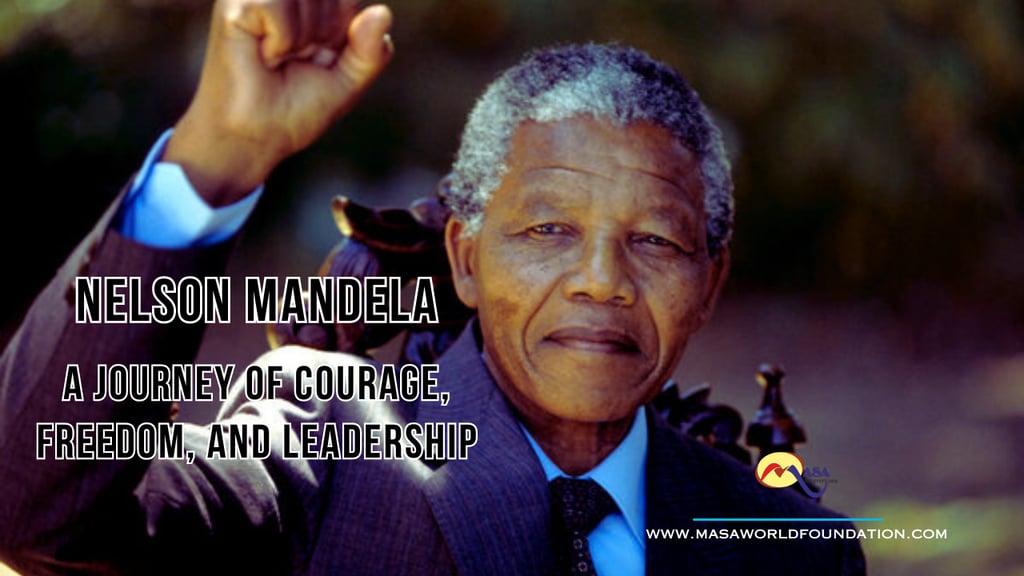Nelson Mandela: A Journey of Courage, Freedom, and Leadership
BIOGRAPHYSOCIAL IMPACT
7 min read


Early Life and Influences
Nelson Mandela was born on July 18, 1918, in the small village of Mvezo, located in the Umtata district of the Eastern Cape in South Africa. He was given the name Rolihlahla Mandela, which means "pulling the branch of a tree" in the Xhosa language. His father, Gadla Henry Mphakanyiswa, was a local chief and counsellor to the Thembu royal family, while his mother, Nosekeni Fanny, was one of his father's four wives. Despite the prominence of his father's position, Mandela's early life was marked by simplicity and traditional rural living.
Mandela's upbringing in the Thembu community exposed him to African traditions, oral history, and the values of his culture. He was deeply influenced by the stories of his ancestors' bravery and the resistance against colonial rule. These narratives instilled in him a strong sense of justice and a commitment to the welfare of his people. His early education began in the local mission school, where he was given the English name "Nelson" by a Methodist teacher, adhering to the colonial practice of renaming African children.
Mandela's journey towards becoming a leader was further shaped by his education at Clarkebury Boarding Institute and Healdtown, a Wesleyan secondary school. At these institutions, he was introduced to Western literature, philosophy, and the principles of democracy and equality. His exposure to the broader context of African history and the struggles against oppression played a significant role in shaping his worldview. It was during his time at Healdtown that Mandela exhibited early signs of leadership, participating in student activities and displaying a keen sense of social justice.
Mandela's early experiences and the cultural heritage of the Thembu people laid a strong foundation for his future endeavours. The values of courage, resilience, and leadership that he absorbed during his formative years became the guiding principles of his lifelong struggle for freedom and equality. These influences were instrumental in Mandela's development into one of the most iconic leaders in the fight against apartheid and for the liberation of South Africa.
Entry into Activism and the African National Congress (ANC)
Nelson Mandela's journey into activism began during his years as a law student at the University of Fort Hare and later at the University of Witwatersrand. His exposure to the harsh realities of racial segregation and injustice in South Africa ignited his passion for change. Influenced by the works of notable figures like Mahatma Gandhi, Mandela developed a keen interest in the principles of nonviolent resistance, which would later shape his approach to activism.
Mandela's involvement with the African National Congress (ANC) marked a significant turning point in his life. Initially founded in 1912, the ANC aimed to unite African people and secure their rights and freedoms. Mandela joined the ANC in 1944, at a time when the organization was revitalizing its efforts to combat systemic racial discrimination. Alongside other young leaders like Oliver Tambo and Walter Sisulu, Mandela co-founded the ANC Youth League (ANCYL), which played a crucial role in advocating for a more radical approach to achieving equality.
In the early 1950s, Mandela's dedication to the ANC's cause grew stronger. He became deeply involved in organizing campaigns and protests against apartheid policies, which institutionalized racial segregation and disenfranchisement of the black population. One of the pivotal moments during this period was the Defiance Campaign of 1952. This mass protest, orchestrated by the ANC and the South African Indian Congress, aimed to challenge unjust laws through nonviolent civil disobedience. Mandela's leadership and oratory skills shone brightly during this campaign, earning him national recognition and solidifying his role as a key figure within the ANC.
Mandela's early efforts in the ANC were not without challenges. He faced constant surveillance, arrests, and harassment from the apartheid regime. Despite these obstacles, his resolve remained unshaken. Mandela's experiences during this period laid the foundation for his unwavering commitment to the struggle for freedom and equality. His transition from a young professional to a committed activist was marked by his ability to inspire and mobilize the masses, setting the stage for his future leadership within the ANC and the broader anti-apartheid movement.
The Anti-Apartheid Movement and Mandela's Role
Nelson Mandela's pivotal role in the anti-apartheid movement is a testament to his strategic acumen, unwavering commitment, and charismatic leadership. His journey began in earnest with the formation of the African National Congress (ANC) Youth League in 1944, an initiative that sought to inject new energy into the struggle against racial segregation. Mandela, along with contemporaries like Oliver Tambo and Walter Sisulu, aimed to transform the ANC into a more radical and mass-based movement, capable of challenging the entrenched apartheid regime.
One of the first major initiatives under Mandela's leadership was the Defiance Campaign of 1952. This campaign represented a coordinated act of civil disobedience against apartheid laws, encouraging nonviolent resistance and mass protests. Mandela, as the National Volunteer-in-Chief, played a crucial role in planning and executing this campaign, which significantly raised his profile as a leader and galvanized widespread support for the anti-apartheid cause. Through speeches and actions, Mandela promoted unity and resilience, urging people to confront injustice with dignity and courage.
Mandela's strategies were not confined to peaceful protests alone. Recognizing the limitations of nonviolent resistance in the face of brutal state repression, he co-founded Umkhonto we Sizwe ("Spear of the Nation") in 1961. This armed wing of the ANC aimed to sabotage government installations and symbols of apartheid, marking a significant escalation in the struggle. Mandela's involvement in these activities demonstrated his pragmatic approach to achieving freedom, and willingness to adapt his methods as circumstances demanded.
Throughout these efforts, Mandela maintained collaboration with other anti-apartheid leaders, fostering a united front. His work with figures like Desmond Tutu, Joe Slovo, and Helen Suzman underscored the inclusive nature of the movement, bridging racial and ideological divides. Mandela's ability to inspire and mobilize diverse groups was instrumental in sustaining momentum and international support for the anti-apartheid cause.
In essence, Mandela's role in the anti-apartheid movement was characterized by a blend of visionary leadership, strategic flexibility, and an unyielding commitment to justice. His contributions laid a robust foundation for the eventual dismantling of apartheid, earning him a revered place in the annals of history.
Imprisonment: Sacrifice and Resilience
Nelson Mandela's 27-year imprisonment stands as a testament to his extraordinary resilience and unwavering dedication to the cause of freedom and equality. Arrested in 1962 and later sentenced to life imprisonment in 1964 for his anti-apartheid activities, Mandela faced harsh conditions at Robben Island, Pollsmoor Prison, and Victor Verster Prison. Despite the physical and emotional toll, he remained resolute and used his incarceration as a platform for continued resistance.
Mandela endured significant hardships during his imprisonment. Confined to a small cell, he slept on a straw mat, performed hard labour in a lime quarry, and was subjected to minimal visitation rights. Despite these deprivations, Mandela's spirit remained unbroken. He continued to educate himself, earning a Bachelor of Laws degree from the University of London through correspondence. His cell became a classroom where he tutored fellow inmates, fostering a spirit of camaraderie and intellectual growth.
Mandela's imprisonment transformed him into a global symbol of resistance against oppression. His plight garnered international attention, leading to a widespread campaign for his release. Organizations, governments, and individuals worldwide rallied behind Mandela, demanding an end to apartheid and his freedom. The "Free Nelson Mandela" campaign became synonymous with the broader struggle for racial equality in South Africa. This growing global support placed immense pressure on the South African government, ultimately contributing to the dismantling of apartheid.
During these years, Mandela's leadership qualities shone brightly. He maintained correspondence with anti-apartheid leaders and continued to guide the African National Congress (ANC) from behind bars. His ability to inspire hope and unity among the oppressed remained undiminished. Mandela's resilience under such dire circumstances demonstrated his unwavering commitment to justice and equality, solidifying his legacy as an indomitable leader in the fight against apartheid.
Release and the Path to Democracy
On February 11, 1990, Nelson Mandela's release from prison marked a pivotal moment in South African history. After 27 years of incarceration, Mandela emerged as a symbol of resilience and hope. His release was not just a personal victory but a significant step towards dismantling the apartheid regime that had oppressed millions. Mandela's unwavering commitment to justice and equality set the stage for profound political and social change.
Upon his release, Mandela immediately engaged in negotiations with the South African government. These discussions were crucial in shaping the future of the nation. Despite facing numerous challenges, including political violence and deep-seated mistrust, Mandela's leadership was instrumental in steering the country towards a peaceful transition. His ability to engage with both supporters and adversaries showcased his dedication to a unified South Africa.
The negotiations culminated in the first democratic elections held in April 1994. For the first time, all South Africans, regardless of race, had the right to vote. This historic event was a testament to Mandela's vision of a free and fair society. The African National Congress (ANC) emerged victorious, and Nelson Mandela was inaugurated as South Africa's first black president on May 10, 1994. His presidency marked the beginning of a new era, characterized by efforts to promote reconciliation and nation-building.
Mandela's leadership during this transformative period was marked by his emphasis on forgiveness and unity. He established the Truth and Reconciliation Commission to address the atrocities committed during apartheid, fostering a climate of healing and accountability. Mandela's commitment to reconciliation helped to bridge the racial and social divides that had long plagued the nation. His presidency laid the foundation for a democratic and inclusive South Africa, leaving an enduring legacy of courage, freedom, and leadership.
Legacy and Impact
Nelson Mandela's legacy is a testament to his unwavering commitment to human rights, equality, and social justice. His leadership was pivotal in dismantling the apartheid system in South Africa, a regime marked by severe racial segregation and discrimination. Mandela's vision for a unified South Africa was not just about political liberation but also about achieving reconciliation and healing for a deeply divided nation. His efforts culminated in the establishment of a democratic government, fostering an environment where all South Africans could aspire to equality and freedom.
Mandela’s contributions extend far beyond the borders of South Africa. His relentless fight for human rights has had a profound impact globally, inspiring countless movements for justice. From civil rights activists in the United States to freedom fighters in various parts of the world, Mandela's principles of equality and justice have served as a guiding light. His Nobel Peace Prize in 1993 underscored his pivotal role in promoting peace and human dignity.
The influence of Nelson Mandela on future generations of leaders cannot be overstated. His life and work have become a benchmark for leadership founded on moral integrity and resilience. Mandela's ability to forgive his oppressors and his emphasis on reconciliation have set a powerful example for leaders who seek to build inclusive societies. His famous words, "It always seems impossible until it’s done," continue to inspire leaders to tackle seemingly insurmountable challenges with courage and determination.
Today, Mandela's principles and values resonate with global movements advocating for freedom and justice. His legacy lives on in initiatives that address social inequalities, promote human rights, and seek to build a more just world. The annual Nelson Mandela International Day, celebrated on his birthday, encourages individuals to take action and inspire change, further cementing his enduring impact on the global struggle for justice and equality.
